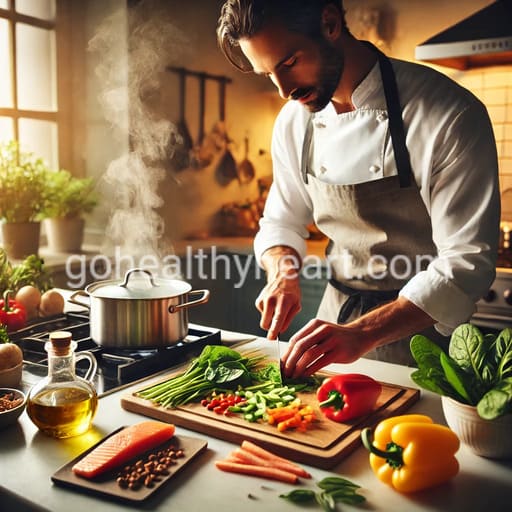Heart Healthy Cooking Methods You Must Try Today!

Introduction
Mastering heart healthy cooking methods is more than a culinary skill—it’s a transformative approach to protecting your cardiovascular health and enhancing overall well-being. The choices we make in the kitchen influence cholesterol levels, inflammation, and overall heart function. From the oils we use to the temperatures we cook at, every detail plays a crucial role in supporting long-term heart health.
The Importance of Culinary Choices in Cardiovascular Wellness
Heart healthy cooking is not just about cutting calories or avoiding fats. It’s about choosing techniques that enhance the nutritional value of food while minimizing harmful compounds. Cooking at high temperatures, for example, can degrade certain nutrients and create harmful byproducts. On the other hand, gentle methods like steaming and poaching can help preserve heart-protective elements.
Modern nutritional science highlights that how we prepare food is just as important as what we eat. Cooking techniques can influence everything from antioxidant levels to the formation of inflammatory compounds. By selecting the right methods, we can support optimal cardiovascular function while enjoying flavorful, satisfying meals.
The Science Behind Cooking and Heart Health
Cooking transforms food at a molecular level, affecting nutrient absorption and bioavailability. Some methods enhance heart-friendly compounds, while others strip essential nutrients. Steaming and poaching, for instance, help retain water-soluble vitamins, while deep frying introduces unhealthy trans fats.
Temperature plays a vital role in this process. Cooking at moderate heat helps prevent the formation of harmful chemicals like acrylamides, which have been linked to inflammation and cardiovascular disease. Understanding the impact of different techniques allows for smarter choices in meal preparation.
Essential Heart Healthy Cooking Methods
Steaming: The Gold Standard for Nutritional Preservation
Steaming is one of the best methods for cooking vegetables, lean proteins, and whole grains. It preserves nutrients by avoiding direct contact with water or oil, ensuring that vitamins and minerals remain intact. This method is especially beneficial for heart health as it prevents the loss of antioxidants and polyphenols found in vegetables.
Poaching: Gentle and Nutrient-Preserving
Poaching involves cooking food in water or broth at low temperatures. This method is ideal for lean proteins like chicken, fish, and eggs. Because it eliminates the need for added fats, it keeps meals light and heart-friendly. The slow, gentle cooking process also prevents the formation of harmful compounds often associated with high-heat cooking.
Grilling with a Heart-Healthy Twist
Grilling imparts rich flavors, but it’s essential to use the right approach. High-temperature grilling can create harmful compounds, so opting for moderate heat and using marinades can reduce these risks. Choosing lean cuts of meat and incorporating plenty of vegetables can further enhance the health benefits.
Sautéing and Stir-Frying: Keeping It Light and Healthy
Using heart-healthy oils like extra virgin olive oil or avocado oil can make sautéing and stir-frying a good choice. Cooking over moderate heat with plenty of vegetables and lean proteins helps retain nutrients while infusing dishes with flavor. Minimizing oil and avoiding overcooking ensures the best nutritional outcomes.
Advanced Nutritional Strategies in Cooking
Understanding Temperature Control
Cooking at excessively high temperatures can degrade healthy fats and proteins. Methods like slow cooking, steaming, and gentle sautéing help preserve essential nutrients while minimizing oxidation. Choosing the right temperature for each ingredient ensures better nutrient retention and heart health benefits.
Maximizing Nutrient Absorption
Certain cooking techniques can enhance the absorption of heart-protective compounds. Lightly steaming vegetables increases the bioavailability of fat-soluble vitamins, while cooking tomatoes releases more lycopene, a powerful antioxidant. Pairing healthy fats with nutrient-dense foods, such as olive oil with leafy greens, can further boost absorption.
Technology and Heart Healthy Cooking
Modern kitchen gadgets have revolutionized heart healthy cooking methods. Air fryers allow for crisp textures with minimal oil, while pressure cookers help retain more nutrients than traditional boiling. Smart cooking thermometers ensure that food is cooked at optimal temperatures without overexposure to heat. These advancements make it easier to prepare nutritious meals while maintaining convenience and taste.
Cultural Perspectives on Cooking for Heart Health
Traditional diets from around the world offer valuable insights into heart healthy cooking. The Mediterranean diet, for example, emphasizes olive oil, fresh vegetables, and lean proteins cooked at moderate temperatures. Asian cuisines often incorporate steaming and stir-frying with minimal oil, preserving the integrity of heart-protective compounds. Adopting these time-tested methods can enhance both flavor and cardiovascular benefits.
Practical Strategies for Implementing Heart Healthy Cooking Methods
Planning meals with heart health in mind requires a few simple adjustments. Batch cooking whole grains, preparing marinades in advance, and investing in high-quality non-stick cookware can make healthy eating more manageable. Keeping processed foods to a minimum and focusing on fresh, whole ingredients further supports cardiovascular wellness.
Common Mistakes to Avoid
Many people unknowingly sabotage their heart healthy cooking efforts. Overheating oils can produce trans fats, while excessive use of salt increases blood pressure risk. Cooking meat at very high temperatures can generate harmful compounds. Being mindful of these factors and making small adjustments can lead to significant long-term health benefits.
Frequently Asked Questions About Heart Healthy Cooking Methods
Steaming, poaching, and gentle grilling are among the most effective. These methods preserve nutrients while avoiding harmful compounds linked to cardiovascular disease.
High temperatures can degrade essential nutrients and create inflammatory byproducts. Cooking at moderate heat helps retain heart-protective compounds and reduces the risk of oxidative stress.
Yes. Methods that avoid added fats and high-temperature processing can help maintain healthy cholesterol levels. Using heart-healthy oils and prioritizing plant-based cooking approaches further supports cardiovascular wellness.
Extra virgin olive oil, avocado oil, and canola oil are excellent choices. They contain beneficial monounsaturated and polyunsaturated fats, which support heart health.
It can be, if done correctly. Using lean proteins, moderate heat, and antioxidant-rich marinades reduces harmful compounds while preserving nutritional value.
The Future of Heart Healthy Cooking Methods
As nutrition science advances, heart healthy cooking methods are evolving. Personalized meal plans based on genetic and metabolic profiles are becoming more common. AI-powered nutrition apps help individuals tailor cooking techniques to their specific health needs. Additionally, sustainable cooking practices, such as reducing food waste and using locally sourced ingredients, are gaining traction.
Conclusion
Heart healthy cooking methods are a powerful tool for maintaining cardiovascular wellness. By making informed choices in the kitchen, we can preserve essential nutrients, reduce inflammation, and create meals that support long-term heart health. Small changes, like opting for steaming over frying or using heart-friendly oils, can have a profound impact on overall well-being.
Your Heart Health Cooking Manifesto
- Embrace Variety: Experiment with different heart healthy cooking methods.
- Stay Informed: Continuously learn about the science of nutrition.
- Be Mindful: Pay attention to ingredient quality and cooking techniques.
- Start Small: Introduce one new method each week for gradual improvement.
- Listen to Your Body: Observe how different foods and preparations affect your energy and well-being.
Making heart healthy cooking a habit ensures long-term cardiovascular benefits. Start with small changes today and build a foundation for lifelong wellness.



One thought on “Heart Healthy Cooking Methods You Must Try Today!”
Comments are closed.